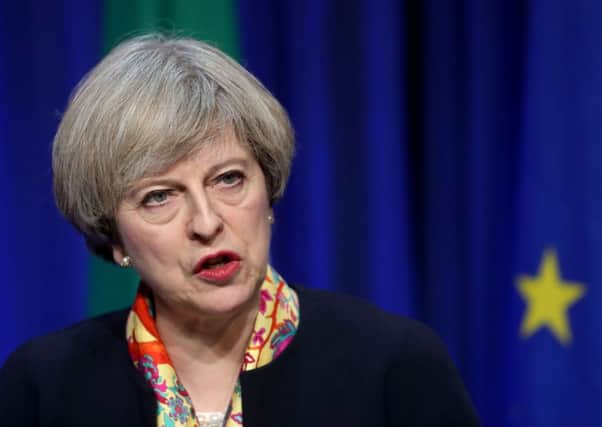Prime Minister hails '˜historic moment' as EU replies '˜we already miss you'


In her letter to EU leaders officially announcing the UK’s intention to quit the EU, Prime Minister Theresa May warned that security and counter-terrorism efforts would be “weakened” if there was no offer of a Brexit deal including tariff and barrier-free trade.
The warning raised the prospect that the UK could withdraw from pan-European DNA and border control databases, and Home Secretary Amber Rudd suggested the UK leave European policing body Europol and “take our information with us”.
Advertisement
Hide AdAdvertisement
Hide AdEU figures hit back, with the European Parliament saying security could not be used as a “bargaining chip” and ruling out holding talks on the UK’s “divorce” settlement and a future trade deal at the same time.
Meanwhile, the SNP warned that if Mrs May continues to rule out a second independence referendum, it would make the end of the Union “inevitable”.
Last night the Prime Minister insisted the UK could hang on to “the same benefits in terms of free access to trade”, but could not confirm that net migration would fall after Brexit.
History was made with the hand-delivered letter invoking Article 50 of the Lisbon Treaty, which was passed to European Council president Donald Tusk in Brussels by the UK’s EU ambassador Sir Tim Barrow. As it was handed over just before 12:30pm, the UK became the first EU member state to request to leave the bloc.
Mr Tusk said: “There is no reason to pretend that this is a happy day, neither in Brussels, nor in London.
“What can I add to this? We already miss you.”
In the House of Commons, the Prime Minister hailed a “historic moment from which there can be no turning back.
“At moments like these – great turning points in our national story – the choices we make define the character of our nation,” Mrs May told MPs.
“We can choose to say the task ahead is too great. We can choose to turn our face to the past and believe it can’t be done.
Advertisement
Hide AdAdvertisement
Hide Ad“Or we can look forward with optimism and hope – and to believe in the enduring power of the British spirit.”
She committed to seeking an early agreement to guarantee the rights of European citizens living in the UK, and Britons in the EU – a sentiment that was echoed by Mr Tusk in Brussels.
But a key component of the UK’s Brexit strategy was immediately rejected, with senior figures including Angela Merkel refusing to discuss a trade deal at the same time as the UK’s “divorce” terms.
The German chancellor insisted that “only when this question is dealt with, can we, hopefully soon after, begin talking about our future relationship”.
Liberal Democrat leader Tim Farron attacked what he claimed were a “reckless series of threats”, but the Home Secretary denied that any threat had been made.
Ms Rudd said: “If you look at something like Europol, we are the largest contributor to Europol, so if we left Europol then we would take our information – this is in the legislation – with us.
“The fact is the European partners want us to keep our information in there because we keep other European countries safe as well.”
She added: “This isn’t a huge contentious issue.”
At a press conference in Brussels, the European Parliament’s co-ordinator for Brexit Guy Verhofstadt responded that security cooperation was “far too important to be a bargaining chip”.
Advertisement
Hide AdAdvertisement
Hide AdAnd a European Parliament resolution on Brexit that will be debated on Wednesday in Strasbourg states that the future UK-EU relationship “cannot involve any trade-off between internal and external security including defence cooperation, on the one hand, and the future economic relationship, on the other hand”.
MEPs are also expected to issue a threat that if the UK tries to start trade talks with any other government before it has left the EU, a future trade deal with the single market could be in jeopardy.
EU rules prohibit member states negotiating their own trade agreements, but the UK has tested the boundaries by opening informal discussions with a number of countries.
The Prime Minister accepted that leaving the European single market would present challenges for UK businesses trading with the EU, even if a trade deal is secured.
“We understand that there will be consequences for the UK of leaving the EU,” she said.
“We know that we will lose influence over the rules that affect the European economy. ”
Unlike her speech in January in which she first set out her Brexit strategy, Mrs May did not repeat her claim that “no deal is better than a bad deal”, which raised the prospect of the UK walking away from talks.
Labour leader Jeremy Corbyn accused the Prime Minister of being “reckless” and said his party would not give her a “free hand” to use Brexit to slash European regulations on workers rights.